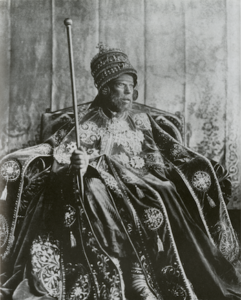
Menelik II
*Menelik II was born on this date in 1844. He was a Black African king of Shewa and Emperor of Ethiopia.
Menelik was the son of the Shewan Amhara king, Negus Haile Melekot. He was born in Ethiopia, where, as a boy, he enjoyed a respected position and received a traditional church education. In 1855, the Emperor of Ethiopia, Tewodros II, invaded the then semi-independent kingdom of Shewa. Menelik was captured and taken to the emperor's mountain stronghold. He was treated well, and he even offered marriage to his daughter Altash Tewodros, which Menelik accepted.
Upon Menelik's imprisonment, his uncle, Haile Mikael, was appointed Shum of Shewa by Emperor Tewodros. The Shewan royals plotted Menelik's escape from Magdela; with the help of Queen Worqitu of Wollo, he escaped from Magdala on July 1, 1865, abandoning his wife, and returned to Shewa. Before the Italians could launch the invasion, Eritreans rebelled to push the Italians out of Eritrea and prevent their invasion of Ethiopia. The rebellion was unsuccessful. However, some Eritreans went to the Ethiopian camp and jointly fought the Italians. Menelik's disagreement with Article 17 of the current treaty led to the war.
In September 1895, Menelik ordered all the Ethiopian nobility to call out their banners and raise their feudal hosts, stating: "An enemy has come across the sea. He has broken through our frontiers to destroy our fatherland and our faith. I allowed him to seize my possessions, and I entered into lengthy negotiations with him in hopes of obtaining justice without bloodshed. But the enemy refuses to listen. He undermines our territories and our people like a mole. Enough! With the help of God, I will defend the inheritance of my forefathers and drive back the invader by force of arms. Let every man who has sufficient strength accompany me. And he who has not, let him pray for us."
Despite the dismissive Italian claim that Ethiopia was a barbaric African nation whose men were no match for white troops, the Ethiopians were better armed, being equipped with thousands of modern rifles and Hotchkiss guns with ammunition and shells, which were superior to the Italian rifles and artillery. Menelik led his army to attack an Italian force in December 1895 at Boota Hill. The Battle of Amba Alagi ended with an Italian force of 2,150 men, losing 1,000 men and 20 officers killed. On January 8, 1896, the emperor's elite Shoan infantry captured the fort's well and beat off desperate Italian attempts to retake the well. Also, in January 1896, the fort's commander, Major Galliano, whose men were dying of dehydration, raised the white flag of surrender. Major Galliano and his men were allowed to march out, surrender their arms, and go free. Menelik stated he allowed the Italians to go free "to give proof of my Christian faith," saying his quarrel was with the Italian government that was trying to conquer his nation, not the ordinary Italian soldiers who had been conscripted against their will to fight in the war.
Menelik's magnanimity to the defenders of Fort Mekele may have been an act of psychological warfare. Menelik knew from talking to French and Russian diplomats that the war and Crispi himself were unpopular in Italy, and one of the main points of Crispi's propaganda was allegations of atrocities against Italian POWs. From Menelik's viewpoint, allowing the Italian POWs to go free and unharmed was the best way of rebutting this propaganda and undermining public support for Crispi. Italy sent another 15,000 men to the Horn of Africa and ordered the main Italian commander, General Oreste Baratieri, to finish off the "barbarians." Menelik was forced to regroup in February 1896 as he ran out of food. On February 28, 1896, the Italians decided to battle with Menelik. On March 1, 1896, the two armies met at the Battle of Adwa. The Ethiopians came out victorious.
With victory at Adwa and the Italian colonial army destroyed, Eritrea was Menelik's for the taking, but no order to occupy was given. Menelik was wiser than the Europeans had given him credit for. Realizing that the Italians would bring all their force to bear on his country if he attacked, he instead sought to restore the peace broken by the Italians and their treaty manipulation seven years before. In signing the treaty, Menelik again proved his adeptness at politics. He promised each nation something for what they gave and ensured each would benefit his country and not another nation. Subsequently, the Treaty of Addis Ababa was reached between the two nations. Though not official until 1941, Italy recognized the absolute independence of Ethiopia, as described in Article 3 of the treaty.
Menelik married three times but had no legitimate child with any of his wives. However, he is reputed to have fathered several children with women who were not his wives, and he recognized three of those children as being his progeny. In 1864, Menelik married Woizero Altash Tewodros, whom he divorced in 1865; the marriage produced no children. In 1865, the same year he divorced his first wife, Menelik married the much older noblewoman Woizero Bafena Wolde Michael. This marriage was childless, and they were divorced in 1882. In 1883, he married Taytu Betul. Menelik's new wife had been married four times previously. They were married in a full communion church service, thus fully canonical and indissoluble.
Empress Taytu Betul was a noblewoman of imperial blood, was his close adviser, and went to the Battle of Adwa with 5,000 troops. Menelik and Taytu Betul owned 70,000 enslaved people. Taytu arranged political marriages between relatives and key Shewan aristocrats. The marriage, which proved childless, would last until his death on December 12, 1913.